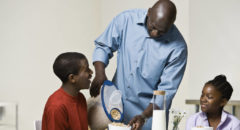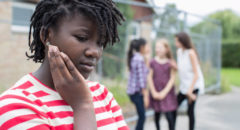 Who today has not heard the term “attention deficit hyperactivity disorder,” or ADHD? No other term in the diagnostic lexicon has more information and misinformation attached to it than ADHD. Everyone you ask — parents, doctors, teachers, psychologists, nurses, neighbors or relatives — will have an opinion on this disorder, and likely their opinions will all differ. Some will toss it off and say their child is just very animated. Some will insist that a child be medicated right away. Others will be adamant that children should never be medicated. Others will claim that eliminating sugar from the diet will eliminate the problem. Still others will question whether there is anything to the diagnosis at all.
Who today has not heard the term “attention deficit hyperactivity disorder,” or ADHD? No other term in the diagnostic lexicon has more information and misinformation attached to it than ADHD. Everyone you ask — parents, doctors, teachers, psychologists, nurses, neighbors or relatives — will have an opinion on this disorder, and likely their opinions will all differ. Some will toss it off and say their child is just very animated. Some will insist that a child be medicated right away. Others will be adamant that children should never be medicated. Others will claim that eliminating sugar from the diet will eliminate the problem. Still others will question whether there is anything to the diagnosis at all.
Since first identified as a diagnosis, ADHD has been given a great deal of attention by neurologists and psychologists. ADHD is now widely recognized as a legitimate mental health problem. Although its exact definition continues to be debated, ADHD is thought to be a neurological impairment, probably originating in the frontal lobes of the brain, affecting a child’s ability to control his or her impulses. Lacking the ability to control their impulses, these children do and say whatever occurs to them from minute to minute. They are quite literally out of control.
There has been a great deal of research to better understand what causes children to have ADHD. Among the identified causes are: heredity (a parent or other close relative with ADHD, although it may have gone unrecognized); problems at birth; and possibly some kind of early emotional trauma that had an effect on the processing mechanisms of the brain.
In some ways, children with ADHD are no different from their peers. One key diagnostic feature noted in children with ADHD is the intense, often frantic quality of their activity. These children are on the move most of the time: climbing the cupboards, tearing about the room, turning over every object that isn’t nailed down — an unending streak of activity and mischief. They quickly wear out their clothes and toys, and usually have more than their share of accidents.
Short Attention Spans
Children with ADHD also have extremely short attention spans. They seem to have difficulty sitting still or waiting their turn. This may be because they are so easily distracted. It often seems that they fail to remember instructions given by a parent or teacher in the time it takes to get from one end of the room to the other. They appear to live only in the present. They don’t seem to think about future consequences. They sometimes can’t remember what they did only moments earlier.
The behavior of a child with ADHD is qualitatively different from the occasional episodes of increased activity in children who do not have ADHD. Every child fidgets or misbehaves from time to time. Children with ADHD, however, are a constant challenge. Their behaviors cause frustration and anger for those around them. Without proper help, these children can become sad or even depressed due to their very accurate perception that the people around them disapprove of everything they do.
Ironically, these very same overactive children can become completely absorbed in a specific activity or task. They sometimes become so over-focused that being asked to shift their attention causes great upset and anger. It is as if the mechanism in the brain that controls their impulsiveness has now gone into overdrive. Once engaged, they can’t let go. Another theory is that these children have learned to compensate for their distractibility by focusing so completely on an activity that they cannot easily alter the track of their attention. They find change initiated by others to be threatening and difficult. This is very confusing for adults because it seems inconsistent with the general stereotypes about ADHD. Puzzled parents often ask things like: “How is it he can remember every arcane move in a video game but can’t remember to take out the garbage?” or “Why can she sit still to watch MTV for hours but can’t sit still through one classroom lesson?”
Friendships & ADHD
Children with ADHD also wear out friendships. Their behavior can be so thoughtless and aggravating, even exhausting, that other children start to avoid them. They miss usual social cues and often blurt out what they are thinking whether or not it is at all appropriate or tactful. Usually good-hearted and wanting friends, they are often mystified by others’ negative reactions to them. It is important to understand that children with ADHD are not trying to be annoying or malicious. In fact, they often seem surprised and embarrassed when their behavior results in rejection by others.
Evaluation for ADHD includes a family history, a medical exam, psychological testing, and, very importantly, a compilation of ratings on paper and pencil behavioral scales completed by parents and teachers who know the child well. A skilled neuropsychologist will recognize patterns in all of these data that generally point to a diagnosis of ADHD.
Treatment Of ADHD
It is generally believed that children with ADHD benefit most from a multidisciplinary approach that comes at the problem in many ways simultaneously. On the medical front, stimulants such as Cylert (premoline), Dexedrine (dextroamphetamine), and Ritalin (methylphenidate) are the medications most often used to treat ADHD in the United States; antidepressants are sometimes prescribed as well. These medications increase activity in the frontal lobes of the brain where impulsivity is managed.
Parents and teachers of children with ADHD must be educated about how to best manage their particular child. Many adults make the mistake of getting into power struggles with these children, trying to control them with harsh disciplinary methods. Children with ADHD really can’t help being the way they are. Yelling, scolding, nagging, and punishing will only make them feel and behave worse. Even more than most children, these children need clear and kind guidance, with an emphasis on what they are doing right.
Early identification of special services in the schools can be very helpful. These children do better is a less stimulating, more orderly environment. They benefit from small classes that are fairly quiet. Activities need to be short and focused, with many opportunities for small successes. Parents and teachers should ideally keep in close contact with each other, sharing what they find to be effective for the child in question.
Finally, physical activity can sometimes help children with ADHD channel some of their excessive energy. They tend to do better at individual sports like swim team, rock climbing, weight lifting, or figure skating. Team sports (where a great deal is going on at once) can sometimes be overstimulating and frustrating for these children.
The goal, of course, is for children with ADHD to get the most enjoyment, learning and growth from each day of their lives. With teaching, encouragement, and support, these children can learn to monitor and manage their symptoms and move on with life.








